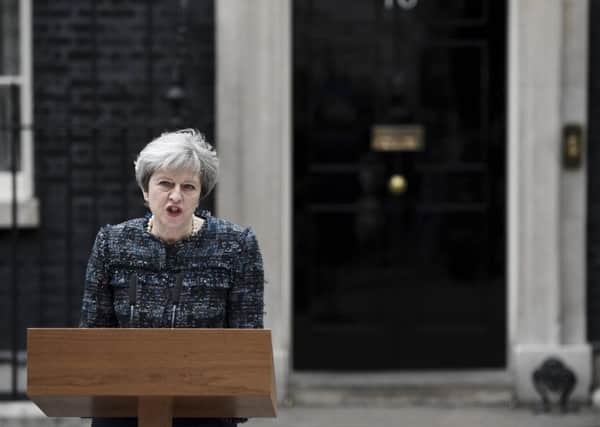Poll points and policy: How the election panned out


Since replacing David Cameron in July last year, in the wake of the Brexit vote, Mrs May had insisted numerous times that there would be no early poll.
But on Tuesday, April 18, the day after Easter Bank Holiday, the Prime Minister stood at a lectern in Downing Street and announced she was calling an election for June 8.
Advertisement
Hide AdAdvertisement
Hide AdAcross the country, parties scrambled to select candidates and organise campaigns for the unexpected dash to the polls.
In Scotland, Mrs May’s announcement came in the middle of the council elections. A year earlier, the timing of the EU vote had meant Scots were still focused on the Holyrood election when the Brexit referendum campaign began; now Scottish voters had a general election piled on top of the local vote.
Mrs May said she was calling the election to strengthen her hand in the Brexit negotiations, but there was no doubt she also hoped to capitalise on Labour’s unpopularity and boost her majority in the Commons from just 12 to a possible 100-plus.
A YouGov poll conducted in the first two days of the campaign gave the Tories a 24-point lead over Labour.
Advertisement
Hide AdAdvertisement
Hide AdFirst, Mrs May had to overcome the obstacle of the Fixed Term Parliaments Act, intended to make sure elections happened only every five years. But this proved easier than many had expected – Labour voted with the government, helping it to the required two-thirds majority. The SNP abstained and ridiculed Labour for behaving like “turkeys ready to jump into the baking tin”.
Scottish Tories, who have had just a single MP since 2001, got an early boost with a poll suggesting they could pick up as many as 12 seats.
And the local elections on May 4 saw Tory gains across the UK. In Scotland the Tories said their analysis of first preference votes suggested they could win up to 15 seats, with SNP big beasts Alex Salmond, Pete Wishart and Angus Robertson all under threat.
Labour’s manifesto – leaked a few days before it was officially published – promised to renationalise energy, railways and Royal Mail, scrap tuition fees, introduce a £10 minimum wage, ban zero-hour contracts, plough money into the NHS and boost police numbers as well as increasing corporation tax and slapping VAT on private school fees.
Advertisement
Hide AdAdvertisement
Hide AdRight-wing critics accused Jeremy Corbyn of wanting to drag Britain back to the 1970s, but polls suggested the radical policies were popular with voters and the Tories’ lead began to narrow.
In contrast, the Tories’ manifesto included plans to axe free school meals for all but the poorest youngsters and a series of measures which would hit pensioners – means-testing the winter fuel payment, ending the “triple lock” on pensions and social care reform to make people pay for their own care until they were left with a maximum £100,000. It was quickly labelled the dementia tax and went down like a lead balloon with voters.
Pundits argued Mrs May was so confident of winning the election that she could afford to adopt policies which might be unpopular with groups who would normally vote Tory.
But soon the polls suggested the dementia tax had seriously alienated her core support – and four days after unveiling the manifesto, Mrs May did a U-turn and promised a cap on how much anyone would have to pay for social care, while bizarrely insisting: “Nothing has changed.” The Tory lead shrank first to nine points, then to five and kept falling.
Advertisement
Hide AdAdvertisement
Hide AdOn May 22 the tragic Manchester Arena killings forced a pause in the campaign – a move sadly to be repeated after the London Bridge attack. Security inevitably became an election issue along with everything else.
The Prime Minister had refused right from the start to take part in any head-to-head TV debates with Jeremy Corbyn or any other leaders – and her refusal seemed to be accepted with surprisingly little fuss from broadcasters or commentators.
But she did appear on the One Show along with her husband, producing the revelation that their home life includes a division of “boy jobs and girl jobs” with Philip taking out the bins.
When the Tory and Labour leaders were separately grilled first by a studio audience and then Jeremy Paxman on Sky and Channel 4, Mr Corbyn won plaudits for his relaxed and fluent answers to the audience. Paxman challenged him over his past comments about the Falklands War and why Labour’s manifesto did not contain more left-wing policies, like abolishing the monarchy. But Mr Corbyn told him: “It’s not in there because we’re not going to do it.”
Advertisement
Hide AdAdvertisement
Hide AdMrs May got a rough ride from the audience, with a nurse warning of “chronic underfunding” of the NHS and a pensioner taking her on over social care. Paxman highlighted a series of U-turns and then told her: “If I was sitting in Brussels, and I was looking at you as the person to negotiate with, I’d think she’s a blowhard who collapses at the first sign of gunfire.”
Mrs May and Mr Corbyn also appeared, again separately, on a special BBC Question Time, when the Prime Minister was confronted by a woman with mental health problems who gave a distressing account of her experience of the capability assessment. Mr Corbyn was pursued by the audience over whether he would press the nuclear button.
Throughout the campaign, the battle in Scotland has looked very different from the one south of the Border. The Tories, Labour and Lib Dems all accused the SNP of being obsessed with a second independence referendum. But Nicola Sturgeon hit back to good effect, pointing out that a Tory leaflet had 26 mentions of an independence referendum.